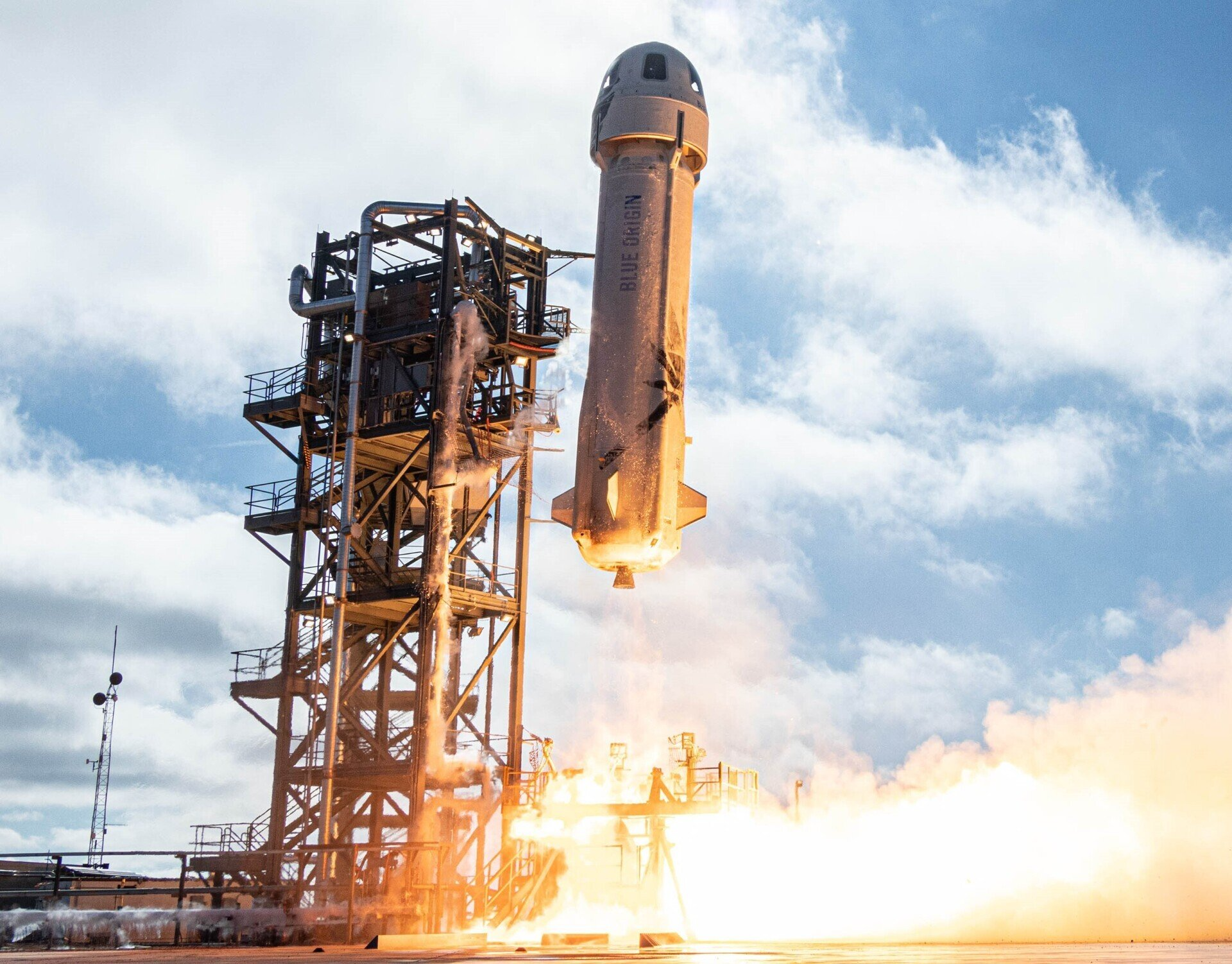

The Overview Effect and VROE: Coming into Being
Wide Open Spaces and Transcendences
(cross-posted from the Human Space Program blog)

The Overview Effect, is a hypothesis and a developing theory first proposed three decades ago by author and space philosopher
Frank White. The phenomenon can be understood as a type of transcendent experience that occurs when we encounter expansive natural landscapes, and Earth gazing can be considered as the optimum of this experience (Nezami 2017; White 2014; Yaden et al., 2017).
Self-transcendence is a term that is often misconstrued, carrying either positive or negative connotations, depending on the context. However, when reduced down to its core, self-transcendence simply means ‘a transient mental state marked by decreased self-salience and increased feelings of connectedness’ (Yaden et al, 2017). Ultimately, self-transcendence involves the expansion of personal boundaries to encompass that which is greater than the self, and this could include the Earth, the universe, or spiritual concepts (Cloninger et al., 1990).
A handful of studies have shown that expansive natural landscapes can meditate transcendent experiences, and more specifically, can promote the emergence of eco-transcendence which is characterized by prosocial emotions (i.e., awe and compassion), an expansion of self, and a stronger connection with the natural world. Usually, the intensity of the transcendent experience is dependent on the magnitude of the scene and the personality and presuppositions of the observer. More generally, there is a growing body of evidence that shows a stronger connection with nature is correlated to psychological wellbeing (for reviews see, Capaldi et al., 2015; Hartig, 2014; Passmore and Howell, 2014). That being the case, the Overview Effect is an area of study that is relevant to the field of psychology and deserves further scrutiny.
Although the Overview Effect is an idea that has been around for decades, it has grown in popularity recently, simultaneously sweeping across the world alongside the Covid-19 Pandemic. Is it a mere coincidence that amidst the despair, boredom, isolation, and helplessness (amongst other things) that Covid-19 gave rise to, ‘man’s search for meaning’ hastened (Frankl, 1984)?
Since the Apollo missions, astronauts and cosmonauts have tried to describe the planetary perspective and more recently citizen astronauts have had the privilege of witnessing the Earth on suborbital flights. For example, on October 13th 2021, William Shatner, the 90-year-old former Star Trek actor, journeyed to the ‘heavens’ on a suborbital flight onboard Blue Origin’s New Shepard rocket. Shatner, upon his return, emerged from the aircraft and clearly looked taken back with tears in his eyes, shortly afterwards he said:
“Everybody in the world needs to do this. Everybody in the world needs to see this...This air that is keeping us alive...It’s thinner than your skin …, ‘Oh, that blue sky, and then suddenly you shoot through it all, as though you whip a sheet off you when you’re asleep, and you’re looking into blackness … it’s so thin, and you’re through it in an instant!”
In many ways, transcendent experiences like Shatner’s allow us to flirt with both the omnipotent and ethereal realms of existence. It's undeniable that expansive nature-based scenes can have a powerful impact on our psyche, and some would say on our souls, providing a glimpse into the boundless and limitless.
Down on Earth, star gazing is one nature-based activity that broadens our horizons and allows us to escape the confines of the ‘small self’ and the drudgery of everyday life! And up in orbit, astronomy is expanded from Earth’s Sky to the infinite Universe where Earth is witnessed as a gestalt, unfolding upon itself.
Human life is ironic, as self-aware beings we are reminded on a daily basis of our existential plight. We are aware that we are limited and our flesh is perishable (mortality, decay, disorder). We are left to struggle with this ‘cruel’ fact, to accept our inevitable suffering and our eventual demise. And therein lies the paradox, we are aware of our mortality and limitations yet in our imagination, we are as vast as the cosmos, free to travel to anyplace, anytime and to be anything. This is no more true than when viewing the Earth from orbit, on the moon, or in space, the majestic view provides a palpable brush with the existential aspects of life; portraying how incredibly fragile human civilization truly is.
Transcendent moments, often evanescent in nature, allow us to connect with the boundless and limitless in a personal and meaningful way, and this dance can give rise to immense awe, the type that can emancipate a person from the confines of the small self. Perhaps when we connect with the immensity of nature (from which we arose), we connect to the aspect of ourselves that we believe to be immortal and numinous.
The 90s saw a resurgence in transcendent research; largely centred on psychedelic-assisted therapy (psilocybin and substances such as MDMA) for the treatment of depression and Post Traumatic Stress Disorder. The scientific renaissance in psychedelics has greatly contributed to a shift in attitudes towards altered states of consciousness and transcendent interventions in clinical settings.
Over the past 30 years, the evidence has grown, demonstrating the clinical relevance and benefits of psychedelic-assisted therapy. Roland Griffiths, a Professor in the Department of Psychiatry and Neurosciences at the Johns Hopkins University School of Medicine has been at the forefront of clinical research in this area. He and his colleagues found that psilocybin with therapy is efficacious in treating Major Depressive Disorder (Davis et al., 2021). Their findings are consistent with previous studies that suggest psilocybin assisted therapy produces antidepressant effects among patients with cancer who experienced psychological distress and patients with treatment-resistant depression (Griffiths et al., 2016; Grob et al., 2011; Ross, Bossis, and Guss 2016).
Dr Robin Carhart-Harris is another leading figure in the field of neuroscience and clinical research in psychedelics. He recently moved from Imperial College’s Faculty of Medicine (now a Visiting Professor) to the University of California San Francisco (UCSF) to become the newly appointed Founding Director of the Neuroscape Psychedelics Division. Carhart-Harris has contributed greatly to expanding our knowledge about the clinical applications of psychedelics. In past clinical trials, Carhart-Harris and colleagues have shown that psilocybin supports the ‘‘resetting” of the brain, and results show marked improvements across a range of subjective measures, including the inability to feel pleasure, and express emotions, greater reductions in anxiety and suicidal ideation, and increased feelings of wellbeing. Based on previous findings, Carhart-Harris suggests that the quality of the psychedelic experience is an important mediator of long-term changes in mental health (Roseman, Nutt, and Carhart-Harris 2018). His move to Neuroscape will look to explore how cutting-edge neuroscience technology can be used alongside psychedelic treatments to support mental health and wellbeing.
Over the years, several notable academics and scientists such as Stanislav Grof, Rosalind Watts, David Nutt, Andrew Newberg, David Yaden, David Glowacki, David Luke, Rick Doblin, Amanda Fielding, and Sam Gandy have contributed to our understanding of the phenomenological aspects and biopsychosocial effects of altered states and in doing so have legitimised evidence-based transcendent treatments. Despite the progress, there are still barriers to entry, as well as a degree of controversy and misunderstanding surrounding what these treatments entail and why they are effective. Although the evidence clearly highlights the potential of psychedelic-assisted psychotherapy, concerns remain over the intensity and relapse rates. Despite the progress made, more empirical research is needed into a range of transcendent interventions and treatments, varying in levels of intensity. Whilst psychedelic-assisted psychotherapy shows promise, it is just one option amongst several transcendent treatment options. Looking ahead to the future of mental health, a range of evidence-based transcendent treatment options will be necessary to meet the needs of a diverse population with complex needs.
In conclusion, although psychedelic clinical trials are showing promise, other self-transcendent interventions and treatments; including ones that rely on multisensory technologies, are emerging as contenders in the field. As transcendent interventions emerge as legitimate treatment options for conditions such as Post Traumatic Stress Disorder (PTSD) and pervasive depression here on planet Earth, their scope could also extend out further, to help offset some of the unique challenges posed off-world, on future deep space missions.
VR-Overview Effect (VROE)
VROE is a virtual reality company that my colleague and I co-founded after I completed my doctoral research on the therapeutic value of the Overview effect. We create evidence-led multi-sensory virtual reality experiences based on the Overview Effect. At the heart of the Overview Effect is connection, awe and gratitude, and these are also some of the characteristics of psychological wellbeing. By creating profound immersive experiences that successfully translate some of the core characteristics and qualities of the Overview Effect, everyday people will have the opportunity to experience controlled transcendent experiences. Although at this juncture, it is far too early to empirically verify any of these assumptions, tech-based transcendent interventions could easily be utilised as an adjunct to therapy and could also help offset some of the unique psychological challenges posed by future deep space missions, where the crew will experience the pinnacle of expansive natural landscapes, whilst potentially having to contend with symptoms of displacement and dissociation.
In many ways, the Overview Effect has never been so important. In Today’s world climate change is recognised as a major existential issue and similarly, Covid-19 has exposed the fragility of current global systems. The planetary perspective allows space travellers to develop a deeper awareness of the Earth as a planetary system located in space and time. The perspective affords an intimate portrayal of Earth and also of humankind, providing the observer with a palpable sense of the fragility of our civilization.
Developing a planetary perspective can help us better understand our connection to the natural world and to the wider cosmos, and this planetary awareness and connection can promote psychological wellbeing and encourage sustainable living.
It is important to try to bring the Overview Effect down to Earth. One way to achieve this is to try to translate essential aspects of the experience via virtual reality. This will allow more people to connect with this profound experience, will help shed light on the meanings and processes involved in the development of emotional ties with nature, and reveal the psychological benefits and social advantages of connecting with nature in this unique way.
Ispace Lab at Simon Fraser University under the guidance of Bernhard Riecke are exploring whether immersive environments can reproduce aspects of the Overview Effect. Frank White (author of the Overview Effect), Assistant Professor David Yaden at John Hopkins University and Nick Kanas, Emeritus Professor of Psychiatry at the University of California have all also greatly contributed to our understanding of the phenomenon. Although the work to date is commendable, more phenomenological and empirical research is necessary in order to expand upon our understanding of the Overview Effect. Virtual reality has by no means reached its zenith, however, it is already proving to be a powerful tool in mental health that can promote prosocial attitudes and tap into the plasticity of the mind and the nervous system.
Bibliography
Capaldi, C. A., Passmore, H. A., Nisbet, E. K., Zelenski, J. M., & Dopko, R. L. (2015). Flourishing in nature: A review of the benefits of connecting with nature and its application as a wellbeing intervention. International Journal of Wellbeing, 5(4), 1-16.
Carhart-Harris, R. L., Erritzoe, D., Williams, T., Stone, J. M., Reed, L. J., Colasanti, A., ... & Nutt, D. J. (2012). Neural correlates of the psychedelic state as determined by fMRI studies with psilocybin.
Proceedings of the National Academy of Sciences,
109(6), 2138-2143.
Cloninger, C.R.; Svrakic, DM; Przybeck, TR (1993). A psychobiological model of temperament and character. Archives of General Psychiatry. 50 (12): 975–90.
Davis, A. K., Barrett, F. S., May, D. G., Cosimano, M. P., Sepeda, N. D., Johnson, M. W., ... & Griffiths, R. R. (2021). Effects of psilocybin-assisted therapy on major depressive disorder: a randomized clinical trial. JAMA psychiatry, 78(5), 481-489.
Frankl, V. E. (1984). Man’s Search for Meaning (1946), rev. Edn. Washington Square Press, NY
Hartig, T., Mitchell, R., De Vries, S., & Frumkin, H. (2014).Nature and health. Annual Review of Public Health, 35(1), 207-228.
Griffiths, R. R., Johnson, M. W., Carducci, M. A., Umbricht, A., Richards, W. A., Richards, B. D., ... & Klinedinst, M. A. (2016). Psilocybin produces substantial and sustained decreases in depression and anxiety in patients with life-threatening cancer: A randomized double-blind trial.
Journal of psychopharmacology,
30(12), 1181-1197.
Grob, C. S., Danforth, A. L., Chopra, G. S., Hagerty, M., McKay, C. R., Halberstadt, A. L., & Greer, G. R. (2011). Pilot study of psilocybin treatment for anxiety in patients with advanced-stage cancer.
Archives of general psychiatry,
68(1), 71-78.
Newberg, A., Waldman, M.R.: How Enlightenment Changes Your Brain: The New Science of Transformation. Penguin (2017)
Nezami, A.: The overview effect and counselling psychology: Astronaut experiences of Earthgazing. Dissertation, University of London (2017).
Passmore, H. A., & Howell, A. J. (2014b). Nature involvement increases hedonic and eudaimonic wellbeing: A two-week experimental study. Ecopsychology, 6(3), 148-154.
Ross S, Bossis A, Guss J, et al. Rapid and sustained symptom reduction following psilocybin treatment for anxiety and depression in patients with life-threatening cancer: a randomized controlled trial.J Psychopharmacol. 2016; 30(12): 1165-1180. doi:10.1177/0269881116675512
Roseman, L., Nutt, D. J., & Carhart-Harris, R. L. (2018). Quality of acute psychedelic experience predicts therapeutic efficacy of psilocybin for treatment-resistant depression.
Frontiers in pharmacology,
8, 974.
White, F.: The Overview Effect: Space Exploration and Human Evolution. Houghton-Mifflin Company, Boston (1987)
White, F.: The Overview Effect. American Institute of Aeronautics and Astronautics, Reston (2014)
Yaden, D. B., Haidt, J., Hood Jr, R. W., Vago, D. R., & Newberg, A. B. (2017). The varieties of self-transcendent experience.
Review of General Psychology,
21(2), 143-160.


